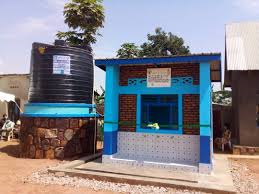By Ira Bien, Akumugisha Clause Karel, Hope Uwase, Irakoze Diane
A newly installed community borehole in Gashora Sector has led to a sharp drop in waterborne diseases, marking a major shift for residents who have long depended on unsafe swamp water.
For years, the village’s 3,000 residents walked nearly two kilometers to collect muddy, seasonal water that contributed to persistent cases of diarrhea, worms, and cholera. According to Gashora Health Post, these illnesses were among the leading causes of child sickness in the sector.
“Before the borehole, we treated at least 15 children every week for diarrhea,” said Nurse Alice Mukamana. “Now, some weeks we receive only three or four. This change is remarkable.”
The project was completed three months ago after a youth group led by Jean Claude Nshimiyimana appealed to a local NGO for support. The community provided labor, collected materials, and helped prepare the site, accelerating construction and enhancing community ownership. Jean Claude said the unity behind the project “set a new example for how villages can solve their own problems.”
Since the borehole became operational, records from Gashora Health Post indicate a 72% drop in waterborne diseases. School attendance among children aged 6–12 has risen by 34%, and households now save an average of 3,000 RWF per week previously spent on medical bills.
Public health experts say the improvements mirror global findings. Studies such as the Rwanda Demographic and Health Survey (DHS) and WHO reports show that access to safe water can cut childhood diarrheal diseases by more than half, a pattern Gashora now reflects. “When clean water is available, everything from nutrition to school performance improves,” said Dr. Clement Nkurunziza, a district health specialist.
Residents describe the change as immediate and visible. “My children have not missed school this term because of stomach pain,” said local mother Mama Chantal. “I used to visit the health center almost every month. Now that money goes to food.”

Students also say the borehole has changed daily routines. “We used to spend two hours getting water,” said 15-year-old Eric. “Now it takes ten minutes. I can finally focus on homework.”
To prevent the borehole from falling into disrepair, the community has formed a Water Committee that collects small contributions from households for maintenance. Plans are underway to build a second tap stand near the primary school to reduce classroom disruptions.
Local leaders say the project has already reshaped community health and cohesion. “Clean water has brought dignity and stability back to Gashora,” the committee chairperson said. “This is not just a borehole, it’s a turning point for our village.”




